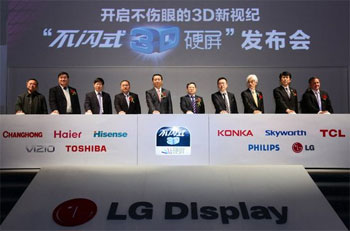The latest episode in the “active versus passive 3D” format war between Korean television manufacturers Samsung and LG Electronics has unfolded in a courtroom down under. According to Sydney-based technology magazine SmartHouse, Samsung – the chief proponent of active-shutter 3D display technology – has been battling to get the passive 3D advertisements of its cross-town rival LG banned from Australian TV networks, claiming that the ads are “misleading and deceptive”.

LG Australia had been planning to broadcast a series of four 15-second TV commercials between May and October 2011, each depicting a specific benefit of its passive 3D technology compared to the active-shutter variant championed by Samsung. In the adverts, an actor dressed up as a scientist used a whiteboard, pointer and split screen to highlight the merits of passive 3D, such as flicker-free and brighter images, as well as the lighter weight and batteryless operation of the polarized 3D glasses used in conjunction with LG’s FPR (film-type patterned retarder) passive 3D LCD TVs.
Having seen the ads which were recently aired during the highest-rated show on Australian television so far this year (the National Rugby League State of Origin Series game between New South Wales and Queensland), Samsung – the leading 3D TV brand worldwide and a strong advocate of active 3D – took it upon itself to dispute LG’s portrayal of active-shutter tri-dimensional technology despite not being directly named in the advertisements. In the first instance, Samsung contacted LG on the 6th of May, asking the latter to withdraw the adverts which the former claimed were in breach of section 18 of the Australian Consumer Act. LG of course refused to comply with Samsung’s demand, but did pull “The Flicker Advertisement” after seeking legal counsel.
Keen to obtain a redress, on the 12th of May Samsung subsequently applied for a temporary injunction in the Australian Federal Court to ban these LG advertisements from being aired on Australian television networks. Samsung challenged the representations conveyed in the TV commercials (all four were played to the court as part of the complaint); Judge Rares who presided over the case even received a live in-court demo when it came to “The Brightness Advertisement”.
However, after watching all four adverts and pondering the assertions put forward by Samsung’s lawyers, the judge decided to reject Samsung’s application, ordering instead that the Seoul-based conglomerate pay for 80% of LG’s legal costs. Explaining his ruling, Judge Rares said that any “ordinary reasonable viewer” would visit an electronics store to get an in-store demo of the two competing 3D display technologies when buying a 3D-capable HDTV, at which point any false impressions created by the ads will be dispelled.
Source: SmartHouse.com.au
